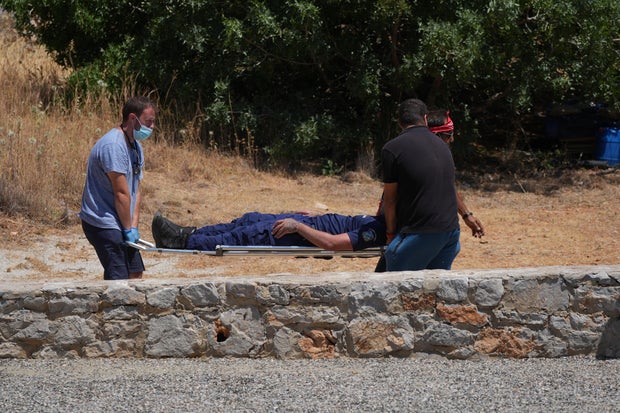Three tourists, including one American, have died and five remain missing in Greece as the country faces extreme temperatures amid a string of heat waves, which have prompted authorities to close schools and historical sights.
The body of an American from New York, who had been missing since Tuesday, was found Sunday on the island of Mathraki, local media reported. Another body was found Saturday on the island of Samos, where a Dutch hiker had been missing for a week.
Earlier this month, the body of British television personality Dr. Michael Mosely was discovered days after he disappeared during a walk on the island of Symi.
Yui Mok/PA Images/Getty
Albert Calibet, 59, a retired police officer who holds duel U.S.-French citizenship, was still missing Monday after he set out on a hike alone Tuesday morning on the island of Amorgos. Two French women and an Israeli couple were also missing, according to reports in Greek media.
A Greek rescue operation leader said tourists appeared unaware of the risks they face walking in the extreme heat.
“We saw a couple [of tourists] walking a trail in 41C [105.8F] without hats,” Dimitris Katatzis told local media, according to Britain’s Independent newspaper. “It defies logic.”
Greece has seen extreme temperatures arrive earlier in its summer season than ever before this year, according to meteorologist Panos Giannopoulos.
“This heat wave will go down in history. In the 20th century, we never had a heat wave before 19 June. We have had several in the 21st century, but none before 15 June,” Giannopoulos told Greek state television channel ERT.
Nikolas Kokovlis/NurPhoto/Getty
The heat has prompted warnings from the government and, last week, the Acropolis and other tourist attractions were closed as winds from North Africa pushed temperatures in Athens to around 109 degrees Fahrenheit. Schools and day care centers were also shut, and firefighters remained on high alert to respond to any blazes.
“The early start of the heat waves, combined with the dry winter, has led to a very difficult fire season,” Vassilis Kikilias, Greece’s Minister of Climate Crisis and Civil Protection said, according to the Independent newspaper.
The high temperatures have hit Greece after a European climate watchdog, the Copernicus program, said data from 2023 showed the continent had experienced a record number of days of “extreme heat stress,” meaning temperatures felt like about 114 degrees Fahrenheit or higher.
Copernicus said heat-related mortality in Europe had risen by around 30% over the past two decades.



